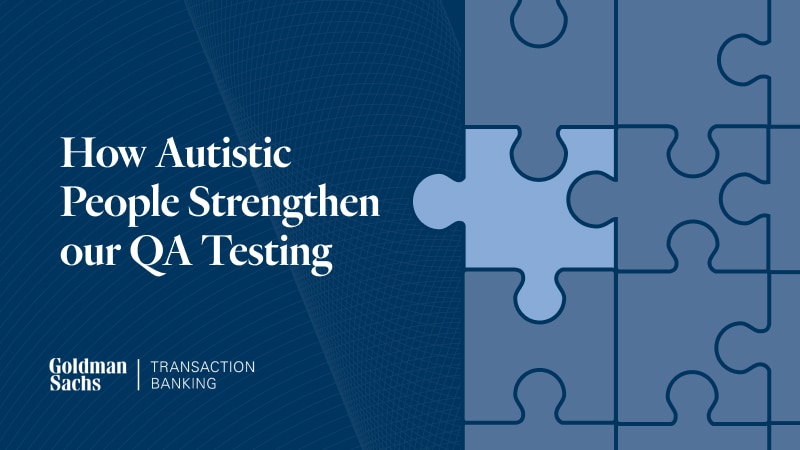How Autistic People Strengthen our QA Testing

By: Bruce Horner – VP, Digital UX Engineering, Transaction Banking
At Goldman Sachs Transaction Banking (TxB), we roll out new software on an ambitious schedule. We constantly deploy new client functions and system updates, and that puts our quality assurance (QA) testing needs front and center. We require an efficient, repeatable way to ensure that our services are always working as intended.
One way we do that is by contracting with Aspiritech, a Chicago company that employs people who are on the autism spectrum doing software testing and data migration. We started working with them last summer for some of our functional QA testing. We’ve been thrilled with the result—and I believe it’s a story worth sharing.
Workplace challenges
One in 54 children in the U.S. is diagnosed with autism spectrum disorder.1 And as adults, those with autism have difficulty finding and keeping meaningful employment. Half of all 25-year-olds with autism have never held a job, according to one study. Brenda and Moshe Weitzberg, who founded Aspiritech in 2008, were themselves motivated by the challenge of finding suitable employment for their son, who is on the autism spectrum.
Aspiritech is now the largest organization of its kind, employing more than 120 adults with autism in two Chicago-area locations. The non-profit company pays competitive wages and provides employees with a workplace tailored to their needs. To accommodate this neurodiverse workforce, Aspiritech offers specialized training, support services, and activities such as game nights and group meals meant to reduce social isolation.
By creating this work environment where those with autism can flourish, the unique skills possessed by this workforce becomes a valuable advantage. Aspiritech points out that their employees have laser-like focus and great attention to detail, a talent for spotting irregularities and strong technical skills. Importantly, they don’t get bored easily, even during highly repetitive tasks.
Neurodiversity’s advantages
Our experience at Goldman Sachs TxB matches everything that Aspiritech promises about the skills of their employees—and more. The functional testing their people do for us ensures that new features work properly and existing functionality remains consistent across a variety of user configurations.
The work they do is manual testing—QA work that doesn’t lend itself to automation. It could be boring for some people, and it’s certainly repetitive. But I’ve learned that the Aspiritech team has a great ability to look at things from a different angle. If I ask them to test a page in a certain way and define certain things that I need to know, they may well come back and tell me about other things that are broken on the page—things I didn’t know to ask about. They bring a very creative approach to these tasks.
Our work with Aspiritech is about making it possible for more people on the autism spectrum to find meaningful work. But it’s also about giving our organization access to talented individuals who can perform our testing tasks with a level of attention and creativity that we would be hard pressed to find anywhere else.
And one more point has become clear to me as I’ve worked with the talented individuals at Aspiritech. As much as it’s necessary to acknowledge the common traits that create employment challenges for people with autism, at some point it becomes a mistake to overgeneralize. An acquaintance who has three children on the autism spectrum put it this way for me: If you’ve met one person with autism, you’ve met one person with autism. When you think you know what a person is capable of doing, you may well be surprised.
This may point to a bigger lesson around how, when we embrace difference in our workplace, everyone can benefit. There are more companies like Aspiritech, and they are growing, and some large corporations that have begun their own hiring programs for people on the autism spectrum. At Goldman Sachs, we will certainly be looking for more opportunities to expand our relationship with Aspiritech and to find other, similar opportunities.
Learn more about Transaction Banking


